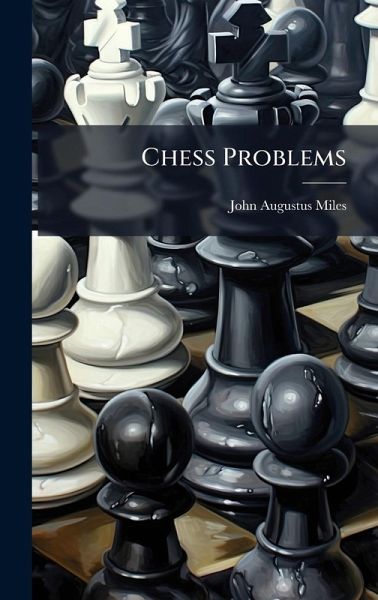
Chess Problems
Versandkostenfrei!
Versandfertig in über 4 Wochen
25,99 €
inkl. MwSt.
Weitere Ausgaben:

PAYBACK Punkte
13 °P sammeln!
"Chess Problems: Composed 1882 To 1885" presents a collection of intricate chess puzzles created by John Augustus Miles. This volume offers a fascinating glimpse into the world of 19th-century chess composition, showcasing the artistry and ingenuity of problem design during this era. Each problem challenges players to find the optimal solution within a set number of moves, demanding strategic thinking and tactical precision. This collection is an invaluable resource for chess enthusiasts and problem solvers interested in the history and evolution of chess problems. It provides hours of engagin...
"Chess Problems: Composed 1882 To 1885" presents a collection of intricate chess puzzles created by John Augustus Miles. This volume offers a fascinating glimpse into the world of 19th-century chess composition, showcasing the artistry and ingenuity of problem design during this era. Each problem challenges players to find the optimal solution within a set number of moves, demanding strategic thinking and tactical precision. This collection is an invaluable resource for chess enthusiasts and problem solvers interested in the history and evolution of chess problems. It provides hours of engaging mental exercise and celebrates the enduring appeal of chess as both a game and an art form. The problems reflect the style and conventions of the period, offering a unique insight into the challenges and aesthetic preferences of chess composers in the late 19th century. This work has been selected by scholars as being culturally important, and is part of the knowledge base of civilization as we know it. This work was reproduced from the original artifact, and remains as true to the original work as possible. Therefore, you will see the original copyright references, library stamps (as most of these works have been housed in our most important libraries around the world), and other notations in the work. This work is in the public domain in the United States of America, and possibly other nations. Within the United States, you may freely copy and distribute this work, as no entity (individual or corporate) has a copyright on the body of the work. As a reproduction of a historical artifact, this work may contain missing or blurred pages, poor pictures, errant marks, etc. Scholars believe, and we concur, that this work is important enough to be preserved, reproduced, and made generally available to the public. We appreciate your support of the preservation process, and thank you for being an important part of keeping this knowledge alive and relevant.


